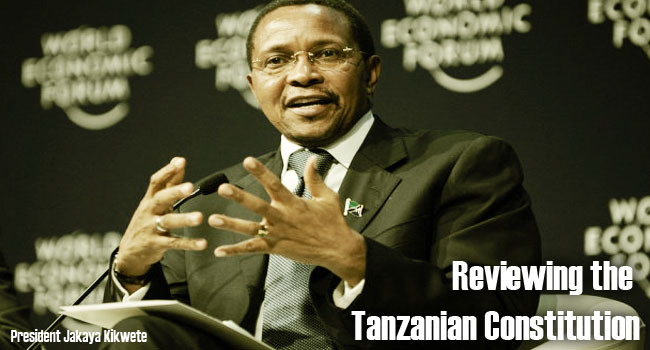Reviewing The Tanzanian Constitution

By Ken Mbaabu
Tanzania is going through one of the most important phases in the history of any modern day democracy. This is especially important because it is part of a group of African countries that have had constitutions, whether pre or post independence, majored mostly on freedom, self-rule and deliverance from the shackles of colonialism, rather than on democracy for the people.
A constitution is the fundamental law of any nation. It is an agreement by the people on how they wish to relate with each other and be governed. It is because of this that a lot of resources, time and emotions are associated with any constitution making process. The Tanzanian nation has been always peaceful and it is worth mentioning that it has managed to maintain this peace even during this period when it is reviewing its constitution. This is in contrast to the constitution making process of its neighbor Kenya, which was associated with demonstrations, oppression and even deaths.
President Jakaya Kikwete instituted a 30-member commission that would go round the country to collect the views of the citizens. The commission, which has been received well by the Tanzanian people with regards to its composition, apart from a few fundamental complaints, was expected to start work from the 1st of May 2012 to finish by the end of October 2013. It is then to come up with a proposed draft, which will be presented to parliament in 2014, when the final Constitution Bill will be tabled for debate and approval, before finally being subjected to a referendum.
The president appointed the 30 commissioners from 550 names, which were presented by political parties, religious organizations, NGO's and other interested parties. The commission has 15 commissioners from Mainland Tanganyika and 15 commissioners from Zanzibar. This has however been criticized since Tanganyika has 40 million people and Zanzibar has 1.5 million people. So there are some who feel that giving Zanzibar an equal number of commissioners is not fair. Another area of concern is the fact that of the 30 commissioners selected 21 are Muslims while only 9 are Christians. Considering that this is a country where the number of Christians and Muslims is almost equal, and considering that the current constitution clearly states that the country is a secular state, there is a feeling that the selection was not fair.
On a brighter note, the president appointed people from diverse political parties including even his fiercest critics. This should signal that he wants to rally the country together for the common good. The commission that is in place has enormous powers to ensure the success of the whole process. The president, politicians, religious leaders and civil societies have called on all Tanzanians to come out in large numbers to give their views on what they wish to be included in the draft.
As is the case with any major Constitutional Review process, there are many important issues that have arisen and are being supported or opposed by various interest groups. Top on the list are
- Separation of Zanzibar from mainland Tanganyika. This has received an equal share of support and criticism. The support and criticism depends on the side of country you reside i.e. either the mainland or Island. Religion has also played a big part on whether people support or reject this separation agenda.
- Reproductive Health Rights is also a very sensitive issue. There is a bill being debated that has been supported by the Pro-choice groups, which would make abortion easier while criminalizing Pro-life doctors who refuse to offer abortion services.
East Africa Center for Law and Justice, wishes to congratulate and offer its support to the people of Tanzania in their initiative to negotiate and have a Constitution that will symbolize the unity and wishes of the people of Tanzania. We wish to encourage the people of Tanzania to come out in large numbers to give their views to the commission so that the final document will accurately reflect the wishes of the majority.
EACLJ also urges the Commission to rise above all partisan interests, whether they be political, religious or even geographical. This is important if the people of Tanzania are to have the constitution they wish for and deserve. Finally, the International Community should help and guide the Tanzanian people without imposing their own wishes on them.


